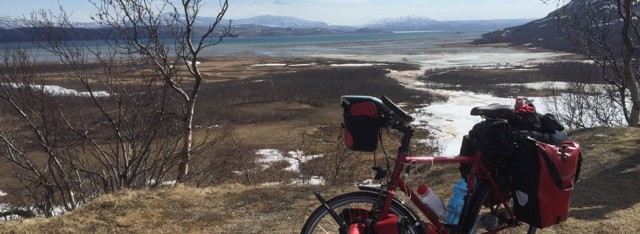If you go down to the woods today…you might see something odd; me falling off a slackline. Slacklining was originally invented by climbers, but has developed a wider appeal over the last few years, and is definitely up there on my list of self propelled sports. Learning to walk across a 2 inch wide piece of webbing is proving pretty tricky, but great fun, and gets me out into the woods at the weekend which can’t be a bad thing. I can only manage about 5 metres without falling off at the moment, however I’m sure controlled bouncing and backflips are only a few weeks away. Travelling Lobster has already attained a much higher level of competence, however I think that’s due to a lower centre of gravity and more limbs; basically he’s cheating.
There are allegedly several benefits to be enjoyed from slacklining, including better balance and posture, improved core strength and concentration, and perhaps even a reduction in your chances of ankle or knee injuries when participating in other sports, which can’t be a bad thing. One can enter an almost meditative state whilst walking the line, as you’re only concentrating on putting one foot in front of the other, and getting to the tree at the other end. Unfortunately my meditative state is usually broken after a few seconds as I tumble off. It’s also pretty hilarious, which helps – laughing is good for the soul. I’ve been learning with a friend, who incidentally is far better than me; the inadvertent monkey noises, arm windmilling, intense expressions of concentration and frequent bouts of swearing are all cause for much hilarity. I’m not sure what people out for a walk in the woods think, must look and sound a bit strange, but I’d throughly recommend it as a cheap, fun, and non environmentally harming activity. Of course you’ll need a bit of patience, but one can look forward to feats such as those being shown off by the individuals in this YouTube clip (I’ve got a way to go yet):
There are loads of YouTube videos you can watch on slacklining, with some pretty amazing stunts, including some people riding bikes over them which I’ll have to try at some point; maybe not with all my panniers on though.
Talking of cycling, two cool things this week, the first being I had my first ever go on a tandem bicycle. There’s a vague plan afoot, with a friend from work, to ride from Cambridge to Norwich on a tandem, raising money for charity. I was slightly dubious of this idea to begin with, especially as my fellow tandem rider hasn’t actually ridden a bike for 25 years, however the initial feasibility study has proven successful, so watch this space.
The second cool cycling thing this week is tickets have gone on sale for this years Cycle Touring Festival in Lancashire. I went to the first one last year, which also marked the start point for my 6 month European cycle tour, and can thoroughly recommend it for meeting like-minded individuals who don’t think you’re a bit strange to go off pedalling for weeks, months, or in some cases years, living off what you can pack on your bike. My friend Tony, who with his wife Gill pedalled around the coast of Britain in 2014, following a similar route to mine from 2013, recently wrote an entertaining blog post about the festival and its attendees – http://www.gillandtony.co.uk/its-a-tribal-thing/
You can get tickets for the festival via their website here: http://cycletouringfestival.co.uk
I should probably explain the title of this blog post. Usually I find coming up with a title for a blog pretty easy, but for some reason I’m failing tonight. I’m going to stick with the lyrics from a song I’ve had stuck in my head for the last few days, ever since watching Mockingjay Part 1, which I really enjoyed and very much lived up to the books. ‘Strange things did happen here’ is quite apt in many ways, as lots of strange things do happen, some of which I’ve described above.
And now on to the not so good strange things. Five dead sperm whales have been found on the East coast of England over the last few days, having beached themselves, probably because they got lost in the North Sea where their sonar doesn’t work too well. The North Sea is too shallow for them compared with their normal ranges, meaning they get lost, and if they beach themselves on a sand bank they suffer cardiovascular collapse and organ failure; not a very nice way to go. Sadly this isn’t an uncommon event on our coastline, but I’m hoping it wasn’t caused by humans in this instance; maybe just the whales getting lost whilst chasing their squid prey, rather than getting confused by sounds in the sea originating from us, or becoming ill from a build up of toxins and beaching themselves (PCBs, plastic, radiation etc). I really don’t want to see any more pictures of people taking selfies with dead whales, or as I saw earlier today someone attacking the carcass to claim teeth as trophies; people are pretty awful sometimes.
This week we’ve continued to see strange weather patterns afflicting much of the world, with freezing temperatures in parts of South East Asia that don’t often go below 10’C, massive snow storms hitting the East coast of North America, and now the UK is beset by more gales and wet weather; although we have it lucky in comparison, at least most of us have central heating. The frankly worrying weather patterns are again caused by hot air being drawn up over the Arctic, including Greenland, forcing cold air south, disrupting the Jet Stream and turning weather normal for this type of year on its head in many areas. This will no doubt melt more glaciers and contribute to sea level rises in the season when these glaciers should be expanding. Reading the science behind this, the culprit is again the human race, due to unchecked CO2 emissions causing global warming in places that really don’t need to be warmed, and thus climate change. It seems obvious we’re in for rough times as the climate further destabilises, although who knows, maybe it’s just a blip; the evidence doesn’t seem to back up a blip though, with CO2 levels at their highest in 3 million years*, causing temperature rises that are warming our atmosphere and seas with devastating consequences.
*http://robertscribbler.com/2016/01/26/arctic-heatwave-drives-deadly-asian-cold-snap/
On the subject of CO2 emissions, the low fuel prices we’re seeing at the moment can’t be a good thing can they? A massive increase in oil production, from tapping shale reserves (fracking) has driven prices down, which in turn must have lead to an increase in use, with demand still rising in China and other fast developing countries. Wouldn’t it have been better to keep prices high, by increasing taxes? This would in turn:
- Show down consumption, meaning reserves would last for longer. It’s not like we’re sustainably farming oil. We don’t plant a new crop every year and thus replace reserves; once it’s gone it’s gone, with some of the alternatives such as Biofuels having equally damaging consequences for the environment.
- Limit CO2 emissions from cars, planes etc, and thus help with meeting targets set in the Paris COP21 agreement
- Increase tax revenue that could then be spent on good stuff, like researching and implementing alternative clean energy sources (fusion, renewables), the NHS, or feeding and homing the homeless
I don’t claim to understand all the economics behind the oil price changes, but it seems to be driven by human greed yet again, as well as politics; wealth and politics won’t matter much if we don’t have a planet we’re able to live on. Can we at least, as I think Stephen Hawking recently said, avoid completely destroying Earth until we have invented viable space travel and are able to colonise other planets; although quite why the human ‘plague’ should be inflicted on other worlds I don’t know, not until we mend our ways slightly anyway.
I’ll pause there on the doom and gloom front, but you have to admit it’s pretty strange how we seem driven as a race to ultimately destroy ourselves? I read a blog today where the author used the phrase ‘challenge our sense of entitlement’. This really struck a chord with me; I think we need to really challenge our sense of entitlement to what we take for granted; excess consumerism, driving a car, burning fuel, waste, our place in the Earth’s ecosystem etc.
I’ll finish with a few humorous, or in the case of the latter touching strange things.
- Trout tickling. How on Earth was that ever invented? Did someone just randomly get in a river one day and approach fish with rather strange intentions? This was one of the topics we contemplated whilst slacklining in the woods, and is something I think I need to try at some point. If you don’t know what it is there are videos on YouTube.
- Ferret Legging. This is the sport where contestants put ferrets down their trousers and see how long they can keep them there. The custom allegedly arose in Yorkshire, which perhaps explains a lot, with individuals trying to hide there poaching activities by keeping these furry and sharp toothed creatures hidden down their trousers; sounds hazardous to me.
- Cheese rolling. This is another bizarre British tradition, which takes place at Cooper’s Hill in Gloucester. Locals started racing rounds of Double Gloucester cheese down the hill, and now people come from all around the world to participate. This has apparently been going on for hundreds of years, however it sounds like something the Victorians would have invented to me, as was for example Morris Dancing, another odd but entertaining pastime. I think I might right a blog just on odd British pastimes.
- The performance artist Marina and Ulay reunite: I saw this video a while ago, and remembered it the other day. I challenge anyone not to be moved by it.










